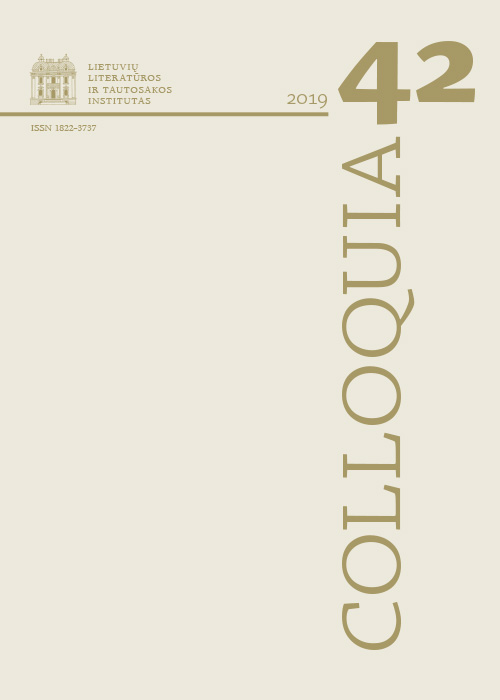Literatūriniai Tomo Venclovos poezijos intertekstai
Santrauka
: Skolinimasis iš kita kalba parašytos arba kitai literatūrinei epochai priklausančios poezijos yra sudėtinė poetinio veiksmo dalis. Pasak Thomo Stearnso Elioto, „nebrandūs poetai mėgdžioja; brandūs poetai vagia; blogi poetai pasiduoda tam, ką perima, o geri poetai paverčia tai kažkuo geresniu arba bent kažkuo kitokiu“. Semiotiniu požiūriu svarbiausia čia – kitos poetinės kalbos transformacija: „reikšmė yra ne kas kita, kaip kalbos vieno lygmens į kitą, vienos kalbos į kitą, skirtingą, transponavimas“ (Algirdas Julius Greimas). Šio straipsnio tikslas – aprašyti įvairiakalbių poetų sąveikos pėdsakus ir aptarti poetinės kalbos transformacijos kryptį.
Autoritetingiausias jaunojo Tomo Venclovos mokytojas buvo Borisas Pasternakas. Ankstyvieji lietuvių poeto eilėraščiai primena Pasternako eilėraščius iš rinkinio Viršum barjerų savo metrika, rimavimo schemomis, aliteracijų samplaikomis. Du Venclovos eilėraščiai, skirti Pasternako atminimui, parašyti 1960 ir 1961 m. Iš Osipo Mandelštamo Venclova „vagia“ daugiausia semantines figūras. Nesiribodamas pavieniais eilėraščiais, jis priartėja prie polifoninio rusų poeto kalbėjimo. Nuolatinis Venclovos dialogo partneris – Josifas Brodskis. Kartais Venclova cituoja arba parafrazuoja lietuvių poetinius tekstus. Jo eilėraščiuose įžeminama Lietuvos XX amžiaus istorija, prisimenamas holokaustas, partizanai, okupacinio režimo aukos. Vertybinę Venclovos poezijos vertikalę palaiko Dante, Shakespeare’as. Iš XIX ir XX amžių atsirenkami Johnas Keatsas, Charle’is Baudelaire’as, Raineris Marija Rilke, Guillaume’as Apollinaire’as, Dylanas Thomas. Kaip poetinis subtekstas pasitelkiama Cypriano Norwido gedulinga rapsodija „Bemui atminti“ ir Czesławo Miłoszo „Ars poetica?“. Vėlyvuoju periodu Venclova yra parašęs penkis eilėraščius Biblijos siužetais.
Atsisiuntimai
Skaitomiausi šio autoriaus(ų) straipsniai
- Kęstutis Nastopka, Juozo Apučio novelių triptiko „Žalias laiko“ vingis diskursinė struktūra , Colloquia: T 40 (2018)
